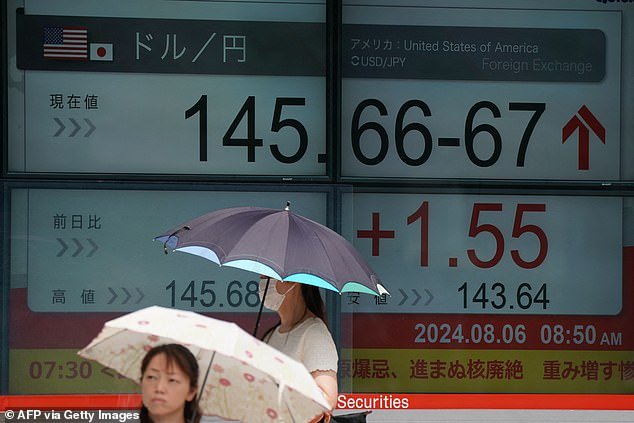Amid the equity market disorder of the last couple of days, one phrase keeps on cropping up: ‘The yen carry trade.’
The sudden claimed expertise on a recherche trading phenomenon allegedly behind the amazing swings in Tokyo shares is impressive.
My knowledge stems from personal experience. In the early 1990s, UK interest rates rose to phenomenal levels as John Major’s government sought to shadow the German market and stay in the Exchange Rate Mechanism.
My plotted escape route from a mortgage rate of 12.75 per cent (people today complain about a standard variable rate of 7.25 per cent) was to take out a mortgage denominated in yen with an interest rate of less than 2 per cent.

Bounce back: Japan’s shares bounced in Tuesday trading recovering some 10% following the biggest sell-off on the Tokyo market since 1987
All was going swimmingly until a geopolitical shock – Iraq’s invasion of Kuwait, – sent the yen soaring against the pound.
My carry trade went horribly wrong and was automatically switched out of yen back into sterling and a much larger mortgage.
That’s more or less what has been happening recently. The combination of a weak yen and relatively low Japanese rates made it highly profitable for professional investors to borrow yen and invest the money in other higher yielding assets such as the Mexican peso.
When the yen soared, after the Bank of Japan raised its key interest rates, global traders offloaded assets bought with borrowed yen.
The unwinding of around half of the estimated £385billion of shares, bonds and currencies leveraged in yen triggered the biggest sell-off on the Tokyo market since 1987.
As is often the case on financial markets, the reaction was overdone and Japan’s shares bounced in Tuesday trading recovering some 10 per cent.
When markets fall on the scale that happened this week, analysts search for explanations. There have been plenty of theories with US recession and tech stock meltdown cited as the main causes.
Sentiment about the American economy and the ‘Magnificent Seven’ is changing. There is belief that valuations of the whole artificial intelligence (AI) revolution have been overdone.
That would be a supreme paradox. Among the reasons why share markets have been so volatile is the impact of algorithm-driven trades largely untouched by human hands. AI means such deals are executed ever more rapidly with ever more efficiency.
Silicon Valley reaps what it sows.
Spin machine
After many years in the shadow of WPP ownership and control, Britain’s leading-edge global communications agency FGS Global has finally lifted the monkey. Private equity giant KKR has bought out WPP’s controlling stake for £629million, placing a value of £1.3billion on the enterprise.
Essentially, financial PR is a people business and partners, including Finsbury founder Roland Rudd, will be incentivised with a 25 per cent stake in the deal.
As helpful an owner as WPP has been, financial communications has always been regarded as peripheral to the main creative drive.
WPP has other agencies such as Hill & Knowlton and Burson (BCW) which are more corporate image and product focused. Departing WPP chairman Roberto Quarta was a key figure in getting the FGS deal done.
Much of global financial communications, a huge earner in the M&A and initial public offerings stakes, is now down to three dominant players, FGS, Brunswick and Teneo.
The way in which City firms lead in the financial spinning space speaks to Britain’s pre-eminence in the provision of business services. FGS is hopeful it can reap the benefits of new tech, notably CRM systems, with KKR help.
The ultimate goal is a float or trade sale within three to five years. Markets, of course, permitting.
Once you pop…
Pringles is on the move again. Created at Proctor & Gamble in 1968, the formulated saddle-shaped chips brand was sold to Kellogg’s in 2012.
It was more recently hived off as part of free standing snacks group Kellanova. Mars has now dived in with a £26billion bid including debt.
Privately owned Mars recently has been on a buying spree snapping up Britain’s boutique chocolatier Hotel Chocolat for £521million in November last year.
Still as secretive as ever, the controlling Mars family are betting heavily on snacking foods making no concession to current trends towards healthier eating.
DIY INVESTING PLATFORMS

AJ Bell

AJ Bell
Easy investing and ready-made portfolios

Hargreaves Lansdown

Hargreaves Lansdown
Free fund dealing and investment ideas

interactive investor

interactive investor
Flat-fee investing from £4.99 per month

Saxo

Saxo
Get £200 back in trading fees
Trading 212
Trading 212
Free dealing and no account fee
Affiliate links: If you take out a product This is Money may earn a commission. These deals are chosen by our editorial team, as we think they are worth highlighting. This does not affect our editorial independence.





